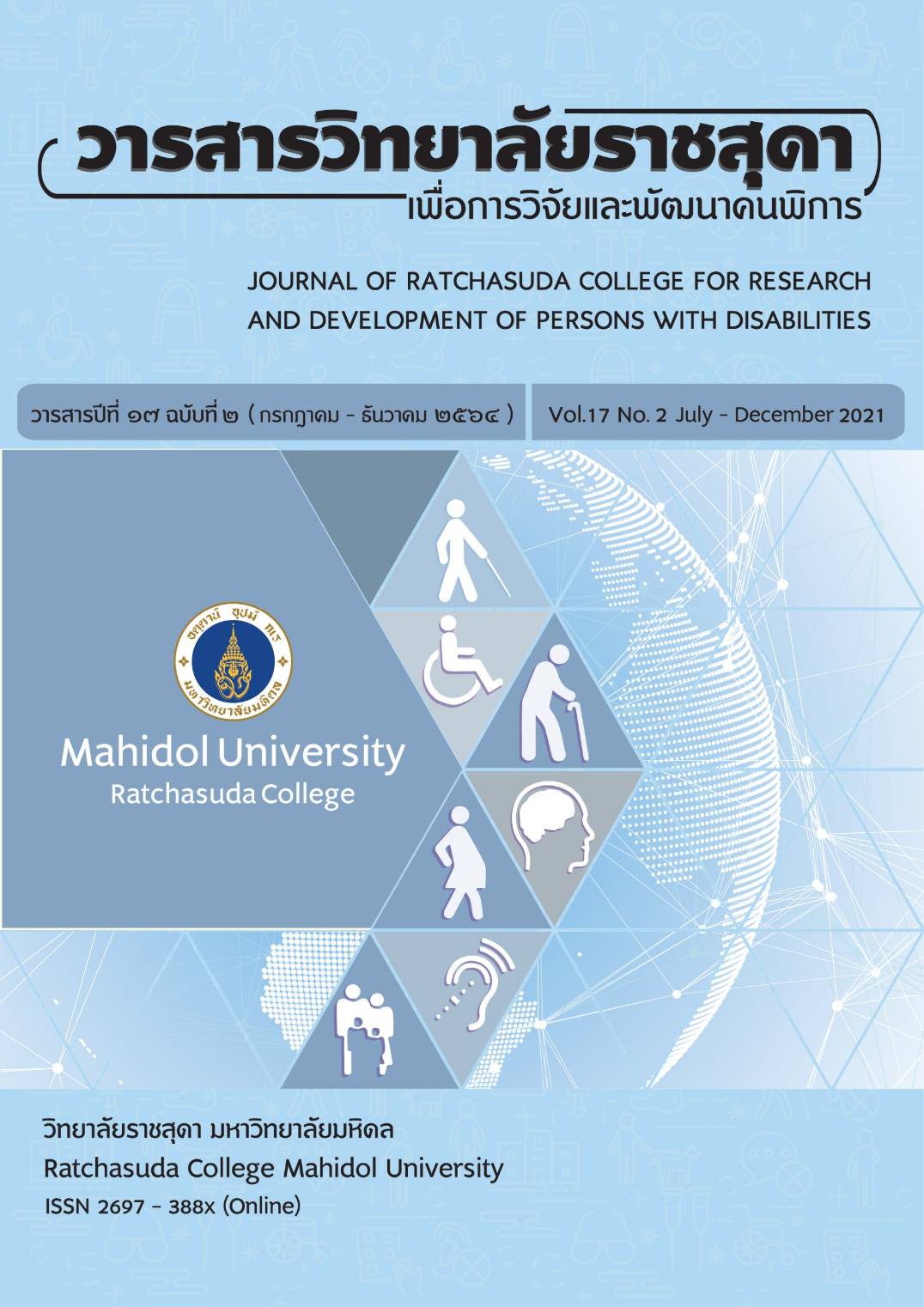The Development of Emotional Quotient (EQ) for Students with Disabilities under Disability Support Services (DSS) Center
Keywords:
Emotional Quotient, Students with disabilities, Emotional Quotient, Students with disabilitiesAbstract
The objectives of this research were 1) to develop a package of guidance activities for promoting Emotional Quotient (EQ) for students with disabilities under Disability Support Services (DSS) center; 2) to implement the developed package of guidance activities for promoting Emotional Quotient (EQ); and 3) to evaluate the Emotional Quotient (EQ) of students with disabilities before and after using the package of guidance activities. The participants in the research were twenty-eight students with disabilities under the Disability Support Services (DSS) center, selected by voluntary sampling. The research instruments consisted of an interview form, a behavioral observation form, and an emotional intelligence test of Department of Mental Health, Ministry of Public Health. Data were analyzed by using percentage, mean, standard deviation, and t-test. The research findings were as follows: 1. The package of guidance activities for promoting Emotional Quotient (EQ) for students with disabilities under Disability Support Services (DSS) center was named “Good EQ Gets Happiness” consisting of seven activities as follows: 1) drawing for self-reflection, 2) three-understanding, 3) like to press ‘Like’, 4) very good of things, 5) problem solving, 6) relationship rope, and 7) gift from heart. 2. After implementing a developed package of guidance activities for promoting Emotional Quotient (EQ) for students with disabilities, the students with disabilities expressed behaviors In accordance with objectives of 7 activities. 3. Before and after the participation in the package of guidance activities, the students with disabilities had higher Emotional Quotient (EQ) at 31.90 percent. The evaluation results according to the emotional intelligence test for students with disabilities before and after the participation in the package of guidance activities, the differences of all aspects were statistically significant at the 0.01 level.
Downloads
References
Chansawang, P. (2016). Personality Problems in Children. Retrieved from http://taamkru.com/th
Department of Empowerment of Persons with Disabilities, Ministry of Social Development and Human
Security. (2020). Statistics of Persons with Disabilities by Gender and Region. Retrieved from http://www.nep.go.th
Department of Mental Health, Ministry of Public Health (2007). EQ: Emotional Intelligence Test (Reverse
version). Division of Mental Health Promotion and Development, Department of Mental Health.
Disability Student Support Center. (2015). Annual Report for the Fiscal Year. Faculty of Education,
Lampang Rajabhat University.
Office of Higher Education Commission. (2010). Guidelines and Principles for Establishing Disability
Student Support Center. Office of Higher Education Commission.
Pantrakool, S., & Chanchalor, S. (2019). The Development of Model for Parent Cooperation in Teaching
Management toward Emotional Intelligence and Learning Achievement of Hearing Impaired Students. Journal of Ratchasuda College for Research and Development of Persons With Disabilities, 15(1).
Poomsanguan, K. & Paikoh, K. (2014). Nurses and Development of Emotional Quotient. Journal of the
Royal Thai Army Nurses Volume, 15(3).
Ramkumar, T., Ramesh, M. (2016). Emotional Intelligence among Differently Able Employees. Saudi
Journal of Humanities and Social Sciences, 16(3), 116-123.
Sukbunpant, S. (2019). Obstacles and success of the adjustment of people with disabilities. Journal of
Ratchasuda College for Research and Development of Persons with Disabilities, 15(1).
Suriwong, P. (2016). Keep up Teens’ Emotion: Cope with Violent Problems. Retrieved from
https://www.thaihealth.or.th/Content/33958- “ออกแบบเมือง”หยุดพฤติกรรมเนือยนิ่ง.html
Yenyuak, C. (2016). Emotional Quotient of Management Major Students, Faculty of Business
Administration, Rangsit University. Journal of Business Administration. Association of Private Higher Education Institutions of Thailand, 4(2).
Downloads
Published
How to Cite
Issue
Section
License
บทความที่ได้รับการตีพิมพ์เป็นลิขสิทธิ์ของวารสารสถาบันราชสุดาเพื่อการวิจัยและพัฒนาคนพิการ






